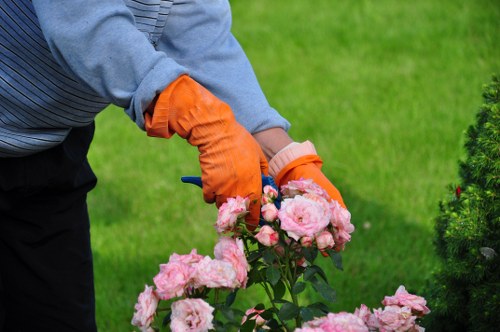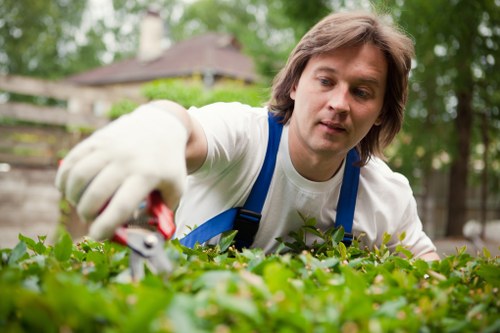Effective Driveway Algae Removal in Notting Hill

Algae on driveways can be a real eyesore, especially in picturesque areas like Notting Hill. The lush greenery and historic homes make the presence of slippery, green algae not only unattractive but also potentially hazardous.
Understanding the best methods for driveway algae removal in Notting Hill is essential for maintaining both safety and curb appeal. Whether you’re dealing with mild growth or a severe algae problem, there are effective solutions available.
In this article, we’ll explore various techniques and products to help you tackle algae on your driveway, ensuring it remains clean and safe all year round.

Why Algae Grows on Driveways
Algae thrive in damp, shaded environments, making driveways in Notting Hill particularly susceptible due to the area's temperate climate and frequent rain.
The combination of moisture and organic matter provides an ideal environment for algae spores to settle and grow. Over time, this can lead to unsightly stains and slippery surfaces that pose risks to pedestrians.
Identifying the root causes of algae growth is the first step in preventing and removing it effectively.

Common Types of Driveway Algae
- Green Algae: The most common type, easily identifiable by its bright green color.
- Red Algae: Less common but can leave reddish stains.
- Black Algae: Rare but more stubborn and difficult to remove.
Each type requires a slightly different approach for effective removal, so it’s important to correctly identify the algae affecting your driveway.
Understanding these variations helps in choosing the right treatment method.

Top Methods for Algae Removal
There are several effective methods to remove algae from your driveway in Notting Hill:
- Pressure Washing: A powerful and efficient way to remove algae and other debris.
- Bleach Solutions: Diluted bleach can kill algae spores effectively.
- Vinegar and Baking Soda: A natural and eco-friendly alternative.
- Commercial Algae Killers: Specialized products designed specifically for algae removal.
Choosing the right method depends on the severity of the algae growth and your preference for natural versus chemical solutions.
Always follow safety guidelines when using any algae removal method.

Preventing Future Algae Growth
Prevention is key to maintaining a clean driveway. Here are some tips to prevent algae from returning:
- Improve Drainage: Ensure water doesn’t pool on your driveway.
- Increase Sunlight Exposure: Trim nearby plants and trees to reduce shade.
- Regular Cleaning: Keep the driveway free from debris and organic matter.
- Apply Sealants: Use protective sealants to create a less hospitable environment for algae.
Implementing these strategies can significantly reduce the chances of algae reappearing, keeping your driveway pristine.
Consistent maintenance is essential for long-term results.
Choosing a Professional Service in Notting Hill
If the algae problem is extensive, hiring a professional driveway algae removal service in Notting Hill may be the best option.
Professional services offer expertise and equipment that can handle even the toughest algae infestations, ensuring thorough and safe removal.
- Experience: Professionals have the knowledge to identify and treat different types of algae.
- Efficiency: They can complete the job quickly, minimizing disruption to your daily routine.
- Safety: Use of appropriate safety measures and environmentally friendly products.
Choosing a reputable service ensures that your driveway is treated effectively and remains algae-free for longer.
Investing in professional help can save time and ensure the best possible outcome.
Cost of Algae Removal in Notting Hill
The cost of driveway algae removal in Notting Hill varies based on several factors:
- Size of the Driveway: Larger driveways require more time and resources.
- Extent of Algae Growth: Severe infestations may need more intensive treatment.
- Method Used: Professional services might be more expensive than DIY methods but offer better results.
- Additional Services: Services like sealing or repair can add to the overall cost.
On average, homeowners can expect to pay between £100 and £300 for professional algae removal services in Notting Hill.
Investing in quality treatment can prevent future expenses related to driveway maintenance.
Environmental Considerations
When removing algae, it’s important to consider the environmental impact of the methods used.
Opting for eco-friendly solutions like vinegar and baking soda can minimize harm to surrounding plants and soil.
If using chemical treatments, ensure they are applied responsibly to prevent contamination of nearby green spaces.
Eco-Friendly Algae Removal Options
For those seeking greener alternatives, here are some options:
- Vinegar: A natural disinfectant that can kill algae without harmful chemicals.
- Baking Soda: Works as a mild abrasive to scrub away algae.
- Boiling Water: An effective non-chemical method for killing algae.
- Essential Oils: Certain oils have antifungal properties that deter algae growth.
These methods are not only safer for the environment but also for your family and pets.
Choosing eco-friendly options aligns with sustainable living practices.
Maintaining Your Driveway Post-Removal
Once algae is removed, maintaining a clean driveway is crucial to prevent recurrence.
Regular sweeping and prompt removal of spills can keep the surface dry and less inviting to algae.
Additionally, applying a protective sealant can provide a barrier against moisture and organic growth.
Long-Term Maintenance Tips
- Inspect your driveway regularly for signs of algae growth.
- Implement proper drainage solutions to prevent water accumulation.
- Trim vegetation near the driveway to increase sunlight exposure.
- Use environmentally friendly cleaning agents for routine maintenance.
- Schedule periodic professional cleanings for thorough upkeep.
Adhering to these maintenance practices ensures a long-lasting, algae-free driveway.
Consistency is key to preventing future algae problems.
Nearby Areas to Notting Hill for Driveway Algae Removal
Driveway algae removal services are not limited to Notting Hill alone. Nearby areas also benefit from professional and DIY solutions:
- Shepherd’s Bush: Just south of Notting Hill, known for its vibrant community.
- Willesden: Located to the north, offering a mix of residential and commercial areas.
- Holland Park: West of Notting Hill, featuring beautiful parks and gardens.
- Kensington: Close by, renowned for its upscale residences.
- Maida Vale: East of Notting Hill, known for its picturesque canals.
- Acton: A bit further west, offering diverse housing options.
- Paddington: Nearby, with excellent transport links.
- Westbourne Grove: East of Notting Hill, famous for its shopping and dining.
- Chalk Farm: To the north, known for its lively market.
- North Kensington: Adjacent to Notting Hill, with a rich cultural heritage.
- Ealing: West of Willesden, offering spacious homes and gardens.
- Portobello: South of Notting Hill, famous for its annual street market.
- Latimer: Close by, known for its community feel.
- Phase: Also near Notting Hill, characterized by Victorian architecture.
Each of these areas has unique features and specific needs when it comes to driveway maintenance and algae removal.
Choosing a local service in these neighborhoods ensures familiarity with the area's specific environmental conditions.
Frequently Asked Questions
1. How often should I clean my driveway to prevent algae growth?
Regular cleaning, at least twice a year, helps prevent algae buildup. Additionally, keeping the driveway free from debris and ensuring proper drainage can reduce the likelihood of algae growth.
2. Is it safe to use bleach for algae removal on driveways?
Yes, diluted bleach solutions can effectively kill algae. However, it's important to use it carefully to avoid damaging surrounding plants and surfaces. Always follow the manufacturer's instructions.
3. Can I prevent algae without using chemicals?
Absolutely. Natural methods like using vinegar, baking soda, or boiling water can remove algae. Additionally, improving sunlight exposure and drainage can help prevent algae from returning.
4. When is the best time of year to remove algae from driveways in Notting Hill?
Spring and autumn are ideal times for algae removal, as the weather is mild and conducive to effective cleaning. Addressing algae growth early in the season can prevent more extensive problems later on.
5. Should I seal my driveway after removing algae?
Sealing your driveway after algae removal can provide a protective barrier against moisture and organic growth, helping to prevent future algae issues. It's a beneficial step for long-term maintenance.


